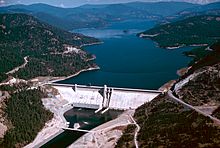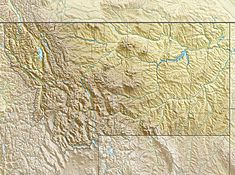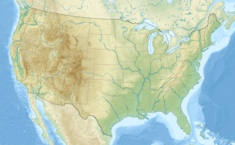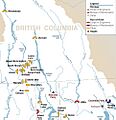Libby Dam facts for kids
Quick facts for kids Libby Dam |
|
|---|---|

Aerial view from southwest in 1986
|
|
|
Location of Libby Dam
|
|
| Country | United States |
| Location | Lincoln County, Montana |
| Coordinates | 48°24′36″N 115°18′50″W / 48.41°N 115.314°W |
| Opening date | 1975 (August 24) |
| Owner(s) | U.S. Army Corps of Engineers |
| Dam and spillways | |
| Type of dam | Concrete gravity |
| Impounds | Kootenai River |
| Height | 422 ft (129 m) |
| Length | 3,055 ft (931 m) |
| Spillways | Gated overflow |
| Spillway capacity | 160,000 cu ft/s (4,500 m3/s) |
| Reservoir | |
| Creates | Lake Koocanusa |
| Total capacity | 6,027,000 acre⋅ft (7.434 km3) |
| Catchment area | 8,985 sq mi (23,270 km2) |
| Surface area | 46,700 acres (18,900 ha) |
| Power station | |
| Turbines | 5 |
| Installed capacity | 600 MW |
| Annual generation | 1,574.4 GWh |
| Website U.S. Army Corps of Engineers - Libby Dam |
|
Libby Dam is a huge concrete wall built across the Kootenai River in northwestern Montana, USA. It is a type of dam called a gravity dam, which means it uses its own weight to hold back water. The dam was officially opened on August 24, 1975. It is located about 17 miles (27 km) upstream from the town of Libby.
The dam is 422 feet (129 meters) tall and 3,055 feet (931 meters) long. It created a large lake called Lake Koocanusa. This lake is a reservoir, which is like a giant storage tank for water. Lake Koocanusa stretches about 90 miles (145 km) upriver and can be as deep as 370 feet (113 meters). About 42 miles (68 km) of the lake are actually in Canada, in southeastern British Columbia.
Contents
What is Lake Koocanusa?
Lake Koocanusa got its name from a special agreement. This agreement was made between the Kootenai Native American people, the Canadian government, and the U.S. government. They worked together to allow the dam to be built and the reservoir to be formed.
Libby Dam was the fourth dam built as part of the Columbia River Treaty. The Kootenai River is a very important river. It is the third largest river that flows into the Columbia River, providing almost 20% of the total water in the lower Columbia. Libby Dam holds back a huge amount of water, about 5.8 million acre-feet (7.15 cubic kilometers).
Building the Dam
Building Libby Dam was a big project. The main architect who helped design it was Paul Thiry from Seattle. A famous sculptor named Albert Wein created a large granite artwork for the dam.
To make space for the dam and the new lake, the town of Rexford had to be moved. Also, a new Flathead Railroad Tunnel was dug for trains. Construction of the dam started in 1966. The reservoir was ready to start filling with water in mid-1973.
How the Dam Works
The U.S. Army Corps of Engineers operates Libby Dam. When the dam is at its fullest, it can release over 160,000 cubic feet (4,500 cubic meters) of water per second.
The dam has a special system that lets operators choose which level of water to release from Lake Koocanusa. This helps them control the temperature of the water flowing downstream. The Kootenai River then continues its journey northwest into Idaho, past Bonners Ferry. It eventually reaches Kootenay Lake in Canada and then joins the Columbia River.
Generating Electricity
Libby Dam has a powerhouse with five large machines called turbines. These turbines can create 600 megawatts of electricity. This electricity is managed by the Bonneville Power Administration. It helps power homes and businesses in eight different states: Montana, Idaho, Washington, Wyoming, California, Utah, Oregon, and Nevada. The money earned from selling this electricity goes back to the United States Treasury. This helps pay for the costs of building and running Libby Dam.
A Special Opening Day
The opening ceremony for Libby Dam in 1975 was a big event. About 5,000 people attended. Important leaders were there, including President Gerald Ford. He was joined by Senator Mike Mansfield, who was a powerful leader in the Senate. Also present was Governor Thomas Judge of Montana.
President Ford "threw the switch" to officially open the dam. He did this alongside Donald Macdonald, who was the Canadian Minister of Energy at the time.
Images for kids
 | Calvin Brent |
 | Walter T. Bailey |
 | Martha Cassell Thompson |
 | Alberta Jeannette Cassell |






